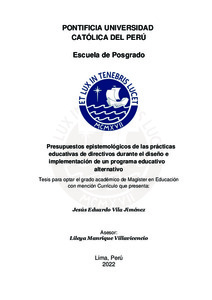| dc.contributor.advisor | Manrique Villavicencio, Lileya | |
| dc.contributor.author | Vila Jiménez, Jesús Eduardo | |
| dc.date.accessioned | 2023-10-09T21:55:55Z | |
| dc.date.available | 2023-10-09T21:55:55Z | |
| dc.date.created | 2022 | |
| dc.date.issued | 2023-10-09 | |
| dc.identifier.uri | http://hdl.handle.net/20.500.12404/26112 | |
| dc.description.abstract | La presente investigación parte de la pregunta sobre cuáles son los presupuestos
epistemológicos de las prácticas educativas de directivos durante el diseño e
implementación de un programa educativo alternativo. En ese sentido, el objeto
general de la investigación consiste en analizar dichos presupuestos, lo cual se
logra a través de dos objetivos específicos los cuales consisten en, por un lado,
describir estos presupuestos durante la etapa de diseño, y, por otro lado, describir
los mismos presupuestos durante la etapa de implementación. Para lograr estos
objetivos se ha hecho uso de una metodología de investigación cualitativa, del
método hermenéutico fenomenológico el cual busca esclarecer interpretativamente
fenómenos de orden social. En consonancia con el método de investigación, como
técnicas de recojo de información, se ha hecho uso tanto de entrevistas
fenomenológicas al igual que del análisis documental. Así mismo, como técnicas
de análisis de información, se ha utilizado la codificación estructural al igual que la
triangulación de fuentes de información. Como resultados de la investigación, en
líneas generales se ha hallado que los informantes de las entrevistas poseen una
concepción relativa del conocimiento, y, así mismo, conciben ampliamente que el
conocimiento se estructura en términos de experiencias más teorías o información.
Por otro lado, también se evidenció, en líneas generales, que los informantes
conciben que el conocimiento se valida primordialmente a partir de experiencias y
la evaluación crítica. Finalmente, los informantes conciben que las fuentes del
conocimiento pueden ser la experiencia, el propio razonamiento, y la autoridad.
Entre los presupuestos del diseño y la implementación, se puede rastrear cierta
continuidad, aunque también se reportan algunas variaciones. Esta investigación,
tanto en su desarrollo teórico, metodológico, y hallazgo de resultados, espera poder
aportar tanto en la comprensión de fenómenos educativos, al igual que servir para
futuras líneas de investigación. | es_ES |
| dc.description.abstract | The present investigation takes as its point of departure the question concerning
what the epistemological presuppositions in the educational practices of directors
during the design and implementation of an alternative educational program are. In
that regard, the general goal of the investigation is to analyze these presuppositions,
and this is achieved through two specific objectives which are, on the one hand, to
describe these presuppositions during the stage of design of the program at issue,
and, on the other hand, to describe these same presuppositions during the stage of
implementation. In order to fulfill these objectives qualitative methodological
research has been implemented, using the hermeneutical phenomenological
method which aims to interpretatively clarify phenomena from the social realm. In
consonance with the research method, as techniques for collecting information it
has been used both phenomenological interviews and documental analysis.
Moreover, as techniques for information analysis it has been used structural coding
as well as the triangulation of sources of information. As results of the investigation
at issue, in general guidelines it has been discovered that the informants hold a
relativist conception of knowledge, and, at the same time, largely maintain that
knowledge is structured in terms of experiences plus theories or information. On the
other hand, it was also evidenced that, in general guidelines, the informants hold
that knowledge is primarily validated through experiences and critical evaluation.
Finally, it was also discovered that informants hold that the sources of knowledge
can be either the experience, or the own reasoning, or the authority. Between the
presuppositions in the design and in the implementation, it can be traced certain
continuity, although some variations are also reported. This investigation, both in its
theoretical framework and methodology and in its results, aims to provide new
insights in the educational phenomena as well as be useful for future lines of
research. | es_ES |
| dc.language.iso | spa | es_ES |
| dc.publisher | Pontificia Universidad Católica del Perú | es_ES |
| dc.rights | info:eu-repo/semantics/openAccess | es_ES |
| dc.rights.uri | http://creativecommons.org/licenses/by-nc/2.5/pe/ | * |
| dc.subject | Educación alternativa--Perú | es_ES |
| dc.subject | Planificación curricular--Perú | es_ES |
| dc.subject | Gestión educativa--Perú | es_ES |
| dc.title | Presupuestos epistemológicos de las prácticas educativas de directivos durante el diseño e implementación de un programa educativo alternativo | es_ES |
| dc.type | info:eu-repo/semantics/masterThesis | es_ES |
| thesis.degree.name | Maestro en Educación con mención en Currículo | es_ES |
| thesis.degree.level | Maestría | es_ES |
| thesis.degree.grantor | Pontificia Universidad Católica del Perú. Escuela de Posgrado | es_ES |
| thesis.degree.discipline | Educación con mención en Currículo | es_ES |
| renati.advisor.dni | 08697895 | |
| renati.advisor.orcid | https://orcid.org/0000-0002-1044-6298 | es_ES |
| renati.author.dni | 45457866 | |
| renati.discipline | 191327 | es_ES |
| renati.juror | Díaz Bazo, Carmen Del Pilar | es_ES |
| renati.juror | Manrique Villavicencio, Lileya | es_ES |
| renati.juror | Pérez Pérez, Marcelo Rodrigo | es_ES |
| renati.level | https://purl.org/pe-repo/renati/level#maestro | es_ES |
| renati.type | https://purl.org/pe-repo/renati/type#tesis | es_ES |
| dc.publisher.country | PE | es_ES |
| dc.subject.ocde | https://purl.org/pe-repo/ocde/ford#5.03.01 | es_ES |







